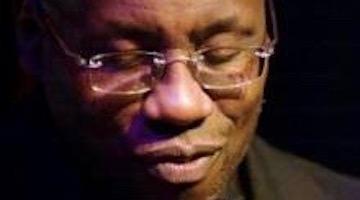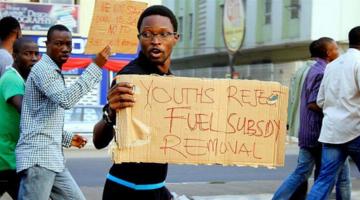In this series, we ask acclaimed authors to answer five questions about their book. This week’s featured author is Jon Jon Moore. Moore is a writer, PhD student in the Department of African American and African Diaspora Studies at UC Berkeley, and host of the AbolitionISH podcast. His book is The Calling: Poems.
Roberto Sirvent: How can your book help BAR readers understand the current political and social climate?
Jon Jon Moore: As the World that anti-Black terror built breaks apart, I think that temporalizing this iteration of hell and desperately engineering futurity out of thin air might be as easy as pulling out the violin and getting’ to stringin’. But I do not think this world is done with us. This world has plans for Black people, it must, and when I’m really feeling myself, my poems ask, “OK, nigga... so... what’s your plan for the world?”
The Calling is interested in what happens after Black people ask this question. After we act on the desire implicit within, what happens to our other desires, to our common sense, to our ability to sustain and create relation with one another?
There’s an interview from the 60s where Nina Simone says that reflecting the times is the duty of the artist. She says, “I choose to reflect the times and the situations in which I find myself.” And what she knew—or at the very least, what I learn from her music, and the work of so many Black women artists and critics, is that the unceasingly violent “times” we inhabit really are—brutally—plural. The scholar of African American literature and cultural history Saidiya Hartman calls this discontinuity “the time of slavery.”
I hope these poems invite readers to sit a bit with that plurality and regretfully understand that sometimes, as the self-help gurus keep reminding us from their ring light lit residences, “what feels like an ending is really a beginning.”
What do you hope activists and community organizers will take away from reading your book?
When I was organizing in college and a bit afterwards, I was consumed by two big ideas. The first was that my present was somehow unparalleled. So, when Michael Brown and Tamir Rice were murdered, I understandably thought—something’s got to give. This time, time will bend to our will. Of course, I was wrong. I remember laying in Harvard Square during a die-in and I was so cold, and for the first time I thought, “Oh. This isn’t refusal—this is a rehearsal.”
The second idea was that as a Black person, I was special. For any reason at all, we can choose to believe that— there’s always that calling, right? Our tenure, our title, our tax stub, our gender, our luck—and all the relations that these things make possible.
I grew up poor in northwest Detroit. My dad’s parents were both teachers, my mom’s parents were immigrants from Mexico. I needed to believe that individuation was possible, and it was salvific. But that, too, came undone with time, and I think it’s because my Black life has been the process of involuntarily remembering our inability to just be.
And when you remember? Good fucking luck! I don’t organize people anymore, but I am trying to organize my thoughts and my feelings. And I hope that Black folks engaged in political organizing find in these poems some good fucking luck.
We know readers will learn a lot from your book, but what do you hope readers will un-learn? In other words, is there a particular ideology you’re hoping to dismantle?
When I became an adult, I learned to accept that there was nothing incidental about suffering. And now, I am trying to unlearn the notion that anti-blackness is a logic problem that language or storytelling can solve, and I hope these poems invite readers to do the same.
The scholar Jared Sexton describes the reckoning that follows as ambivalence, Toni Morrison describes it in Beloved as the Clearing, and it’s the title poem in The Calling.
As I’ve continued to internalize this, I’ve become audibly & cognitively quieter. It’s weird. I’m not evading the coercion embedded in the desire to tell any story at all, but I am becoming more aware of it. And while my Twitter doesn’t’ slap like it used to, this unlearning is not leading me nowhere—at least not anywhere worse than here. I appreciate the people in my life who remind me of this.
Who are the intellectual heroes that inspire your work?
Well to start, the title of this chapbook is indebted to the Black philosopher and legal theorist Anthony Paul Farley. He wrote an article titled “Perfecting Slavery” that’s haunted me ever since I read it—not only because it so convincingly argues that law is a doomed domain that disciplines Black people and cultivates a desire within us to be disciplined, or “calls” us to perfect slavery—but stylistically, it’s unsettling. Farley uses repetition, anecdote, and metaphor in really arresting ways.
In general, I’m a Philosophy Girl indebted to theorists of Black life, in the US and across the diaspora. I’m not interested in representation or rhetorical remediation and for that I have Black philosophers to thank: Christina Sharpe, Frank B. Wilderson III, Axelle Karera, Calvin Warren, Patrice D. Douglass, Selamawit D. Terrefe and many more.
And if readers are familiar with and enriched by the work of these folks, I encourage them to read recent work by younger Black scholars, too—Tyrone Palmer, Taija McDougall, and John Dennis Gillespie are just a few. I look up to all of them.
I should also say that Black poets can’t help but be exhaustively intellectual. They’re always philosophers, too, of history and the body and desire, and I learn so much from them. Off the dome: Dionne Brand, Justin Phillip Reed, Khadijah Queen, Adrian Matejka, Ladan Osman, Philip B. Williams, Momtaza Mehri. Each has given me a new grammar and good wind.
In what way does your book help us imagine new worlds?
I don’t know if I want my poetry to help us imagine new worlds. We are trained to sustain anti-Black violence at every level of abstraction, and I hope that these poems, and any future work I create, gives readers language to describe this reality.
And then, maybe with some terrible clarity, a reader refuses to imagine any new world that is recognizable to them as such. I don’t think I am there yet, but that would be really cool.
If someone said to me, “Hey, I blame this poem for my insatiate desire for impossible things,” I’d be like, “Fuck yeah! I’m so happy. Let’s get better at imagining endings together.”
Roberto Sirvent is editor of the Black Agenda Report Book Forum.



















